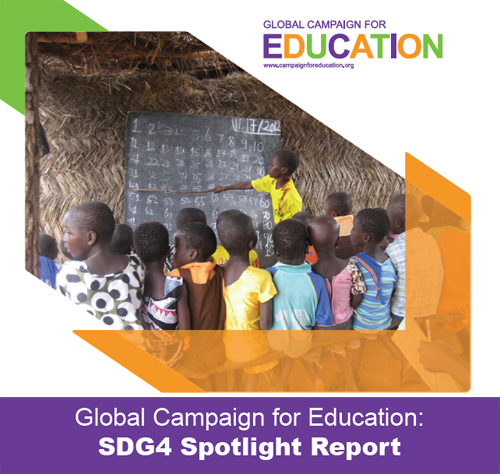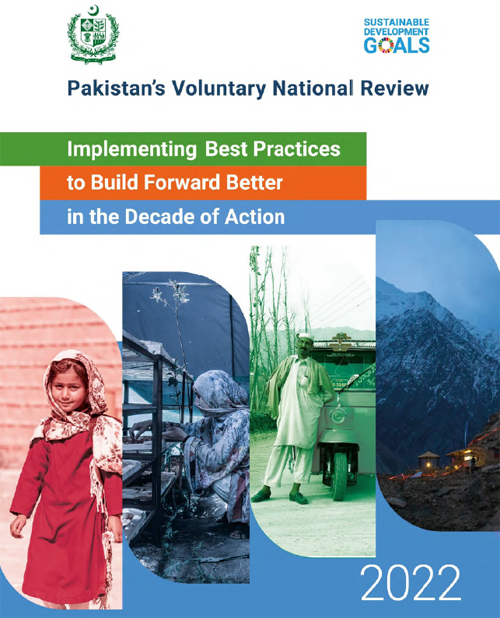Disclaimer: Website Under Maintenance: Our website is currently under maintenance. We apologize for any inconveniences.
Global Campaign for Education (GCE) has published a spotlight report on the Sustainable Development Goal 4: Quality Education. This spotlight report examines the challenges facing global communities in ensuring inclusive and equitable quality education for all, particularly for marginalized groups.
Based on contributions from GCE's national and regional members, including Pakistan Coalition (PCE), the report offers a comprehensive look at context-specific challenges encountered by diverse communities worldwide.
Keeping the specific targets of SDG4 and the Thematic Action Tracks drafted at the Transformative Education Summit in mind, the report is organized along four key thematic areas: Transformative Education; Digital Learning, Education in Emergencies and Crises; and Education Financing. By looking at country specific examples, this report engages with policy discussions around the growing possibilities of our education systems, the inclusion of marginalized and disadvantaged communities, the provision of equal opportunities and facilities, the adaptive capacities required for a rapidly changing world and the state's responsibility of ensuring sustainable and sufficient financial resources for education.
Pakistan Coalition for Education (PCE) is one of the many coalitions offering evidence for the disproportionate impact climate change has on education, as well as advocating for disaster-resilient education systems and an enhanced curriculum that builds awareness around climate change. Through this analysis, the report provides insights about policy challenges that governments must address to secure the right to education for everyone.

Pakistan was the first country to adopt the SDGs as its own national development agenda in February 2016. Government adopted a consensus based national Vision 2025 for sustainable development in 2014-151. The strategic synchronization between Vision 2025 and the 2030 Agenda shows the Pakistan’s strong commitment and continuous ownership for achieving international agenda for sustainable development.
Focus of 2nd VNR is to highlight the inclusive development approach by the government and how SDGs have contributed to expanding social protection coverage for those left behind, especially during the severity of the COVID-19 pandemic. The development of the VNR 2022 has been steered by the Ministry of Planning, Development and Special Initiatives (MoPD&SI) with a whole of government and whole of society approach involving all relevant stakeholders including subnational and regional governments, civil society organization, development partners, media, academia, parliamentarians, think tanks and the private sector.

Sustainable development goals were adopted by the Parliament of Pakistan in 2016 and eventually embedded in the Pakistan Vision 2025. A national framework was then developed in 2018 for the implementation of these goals. However, budgetary documents, PC-1s and the provincial sector plans for education reflect no synergy with the sustainable development goals. The unanticipated pandemic on top of that have further deteriorated the little progress in this regard. This white paper prepared by one of our member organizations Pakistan Youth Change Advocates (PYCA) is an effort to assist the government to “identify and correct its structural lacunas, finally align its investment priorities under education with SDG4 and march its way to the finish line”. It also offers a set of recommendations that are necessary to propel the country to meet the 2030 Agenda.
We all know that technology is transforming the way we live, learn and earn. This makes it even harder for girls to compete in a rapidly changing labour market. It’s vital that we prepare girls today for tomorrow’s jobs. But right now almost one billion girls aren’t able to learn the skills they need to succeed. Malala Fund launched Full Force, a report that makes the economic case for investment in girls’ education and calls on leaders from G20 countries to take action.
In 2017, the second report in the Global Education Monitoring (GEM) Report series continues its assessment of progress towards the Sustainable Development Goal on education (SDG4) and its 10 targets, as well as other related education targets in the SDG agenda. It also investigates accountability in education, analyzing how all relevant stakeholders can provide education more effectively, efficiently and equitably. The report examines different accountability mechanisms that are used to hold governments, schools, teachers, parents, the international community, and the private sector accountable for inclusive, equitable and quality education. By analyzing which policies make accountability work or fail, and which external factors impact on their success, the 2017/8 GEM Report concludes with concrete recommendations that will help build stronger education systems.
The fifth annual District Education Rankings by the Alif Ailaan education campaign was launched in December 2017. The rankings use official government data from across the country, along with data from the State of Education (ASER) survey, to assess the performance of districts in education. To read more about where each province and district ranks in education performance, follow the link below.
The Pakistan Education Statistics Report 2015‐16 is comprised of two sections. Section 1 focuses on the analytical aspects through trend analysis as well as measuring the effectiveness of the education system in the country whereas section 2 focuses on education data pertaining to all to all categories of education institutions of both public and private sectors from pre‐ primary to tertiary levels. Also included is the data in respect of vocational, technical, teacher‐training institutions, non-formal basic education and Deeni Madaris working under both private and public sectors of education. To read the full report, please follow the link below.
The privatization of education occupies an increasingly large place in the educational debate. Many concerns have emerged with the rapid expansion of the process of privatization since the last decade, especially for developing countries where the public system is often overwhelmed and may be unable to cope with rapidly rising demand. International law, which is only binding for states, does not explicitly refer to privatization or commercialization; therefore, legal issues arise from these problematic. This report intends to clarify these issues by briefly recalling the nature of states’ obligations regarding the right to education (I); by presenting private education (II); by underlining the new challenges to the right to education in regard to private providers (III); by pointing out the reported positive and negative impacts on education (IV) and, finally, by suggesting legal solutions to avoid violations of the right to education (V). To read the full report, please follow the link below.
National and international developments in education have created conditions for revision of National Education Policy 2009. Since devolution of social sector, ministries including Ministry of Federal Education and Professional Training under 18th amendment; insertion of article 25(a) in the constitution under which free and compulsory education of all the children aged 5-16 (up to matric) became a fundamental right and the state responsibility; and replacement of Education For All (EFA) and Millennium Development Goals (MDGs) by the UN’s Sustainable Development Goals (SDGs) that have been adopted by Pakistan. The new National Education Policy 2017 has been designed in the perspective of 18th Amendment in Constitution of Pakistan modern trends in education and emerging requirements of society in terms of national integrity and social cohesion. To read the fully policy, please follow the link below.
UNESCO organizes periodic consultations to monitor the implementation of the Convention and Recommendation against Discrimination in Education. The Eighth Consultation of Member States, covering the period from 2006 to 2011, has been completed and the results of the Consultation were presented to UNESCO’s Governing Bodies in September and November 2013. National reports submitted for this purpose show that many States have reinforced their legal frameworks to ensure gender equality and equity, and have adopted measures to make their education systems more inclusive of girls and women. This document compiles the explicit references to girls’ and women’s right to education in national reports and is intended to serve as a practical tool for both advocacy and monitoring. To read the full report, please follow the link below.